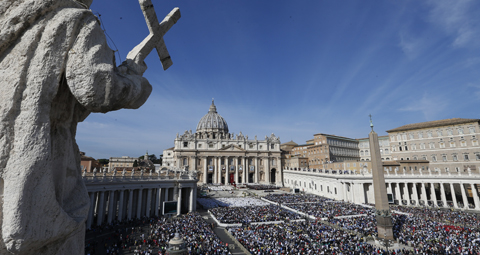BY Ryan McDougall | October 18 | ![]() 0 COMMENTS
0 COMMENTS ![]() print
print

All roads lead to Rome
A pilgrimage to the canonisation of Cardinal Newman has Fr McMorrin reflecting on the Eternal City
Pope Francis has given stern warnings about the scandal of ‘airport priests’: clerical frequent fliers who spend more time travelling around the world than ministering in their own parishes and dioceses. I hope he’ll forgive me for writing this column at 33,000 feet in the skies somewhere above France.
In my defence, this wasn’t a five-star luxury holiday but a pilgrimage, accompanying a group of young people to a Mass celebrated by the Holy Father himself. After three nights sleeping in a budget youth hostel and a packed schedule trekking around Rome’s dusty streets, his admonition to live with the ‘smell of the sheep’ has, over the past few days, taken on a new and vivid literalism for me.
My own little flock, of course, didn’t smell too bad, but they are returning to Scotland slightly bleary-eyed from our late nights and early mornings, with blistered feet and sunburnt heads adding to the penitential value of an authentic pilgrim experience.
Spiritually recharged
One young man said at the airport this morning that Rome has left him ‘spiritually recharged but physically shattered.’ I know how he feels.
We were brought to Rome by Cardinal John Henry Newman, who, along with four others, was declared a saint by Pope Francis on October 13. Newman has long been a hero of mine and so when, over a drink in the pub one evening, one of our young people mooted the idea of a pilgrimage, we got a little group together, packed our bags and headed for the Eternal City.
We were following in Newman’s own footsteps. Although he is a most quintessentially English saint, trips to the city of Rome had a decisive influence on the story of his life: as a young Anglican clergyman on a grand tour of Europe, as a new convert, embracing the Catholic Faith in all its fullness and, finally, as an elderly man being made a cardinal, in recognition of a life spent in service of the Truth.
He said in 1833, some 12 years before his reception into the Church, that ‘Rome is of all cities the first, and all others I ever saw, even dear Oxford inclusive, are but as dust, compared with its majesty and glory.’
Contrasts
He nonetheless recognised a city of contrasts, in which paganism and the Gospel, superstition and piety, holiness and cruelty still live side-by-side: he was unimpressed by the moral character of many of the people, but edified by the simplicity and fervour of their religious devotion; he didn’t think terribly highly of the pontifical universities, but learned a great deal from an immersion in the culture and the traditions of a city hallowed by countless saints and martyrs.
Although day-to-day life in the city is not without its challenges and frustrations, my own ‘Roman years’ were a great blessing and I thank God for them: the friendships, the studies, the proximity to the saints and to the Holy Father were formative in so many ways. Quite apart from the formal lectures and seminars, Roman life is an education: it is a reminder that we belong to a worldwide Church, which stretches throughout history and throughout the world.
We are the heirs of a tradition that goes back to the Apostles themselves, handed on through good times and bad. The breath-taking beauty of the churches, the art, the music, the statues are our inheritance: they belong to us! In Rome, we see them in their proper context: not in an exclusive gallery, reserved for an elite intelligentsia, but dedicated to the glory of God, and, like the Church herself, open and available to all-comers.
Amazon synod
Rome is the meeting place of the whole world: during the month of October, bishops and cardinals from across the world are assembling in synod to discuss issues of vital importance and they need our prayers in a very special way.
But I’m thinking not only of them; I’m thinking of all of the ordinary people I bumped into in queues, in coffee shops and in churches over the past few days. I’m thinking of the seminarians from countries I’ll almost certainly never visit who I sat next to in lectures and whose experience of the Church enriched and broadened my own perspective.
At the end of the Mass of canonisation, pilgrims waved their flags and held their banners aloft. I was delighted to spot a few Scottish saltires amid the sea of colours. Sights such as these are a sign of the fulfilment of the commandment heard by St Peter and the other apostles, to ‘go and make disciples of all nations.’
Among the ranks of the saints are now included those canonised last weekend: an Indian mystic, a Swiss laywoman, an Italian nurse, a Brazilian nun and an English priest. May they, and all the saints in whose Roman footsteps we’ve trod, intercede for us, keep us faithful to our inheritance and inspire us—when we’ve caught up on some lost sleep!—to share with others the many blessings of our Catholic and Apostolic Faith in which we’ve been renewed.










